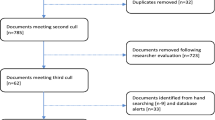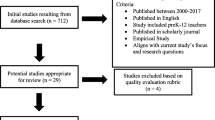Abstract
The purpose of this paper was to review the literature in terms of professional development activities that researchers have enlisted to reduce student problem behaviors and improve classroom management competencies among teachers who work in urban environments serving predominately African American students. First, the author conducted a systematic literature review to collect articles that studied trainings intended to reduce student problem behaviors and improve classroom management competencies. Next, the author summarized the literature in terms of types of trainings, populations, designs, measures, intended outcomes, and results. Based on themes found in the literature, the author discussed implications and suggestions for future research.
Similar content being viewed by others
References
Note: * indicates studies included in the systematic review
Abel, M. H., & Sewell, J. (1999). Stress and burnout in rural and urban secondary school teachers. The Journal of Educational Research, 92(5), 287–293. doi:10.1080/00220679909597608.
*Becker, K. D., Bradshaw, C. P., Domitrovich, C., & Ialongo, N. S. (2013). Coaching teachers to improve implementation of the good behavior game. Administration and Policy in Mental Health and Mental Health Services Research,. doi:10.1007/s10488-013-0482-8.
Black, R. S., Mrasek, K. D., & Ballinger, R. (2003). Individualist and collectivist values in transition planning for culturally diverse students with special needs. Journal for Vocational Special Needs Education, 25, 20–29.
*Bohanon, H., Fenning, P., Hicks, K., Weber, S., Thier, K., Aikins, B., & Irvin, L. (2012). A case example of the implementation of schoolwide positive behavior support in a high school setting using change point test analysis. Preventing School Failure: Alternative Education for Children and Youth, 56(2), 91–103. doi:10.1080/1045988X.2011.588973.
Bondy, E., Ross, D. D., Gallingane, C., & Hambacher, E. (2007). Creating environments of success and resilience: Culturally responsive classroom management and more. Urban Education, 42(4), 326–348.
Bradshaw, C. P. & Domitrovich, C. E. (2008). Coach visit log. Unpublished instrument. Baltimore, MD: Johns Hopkins Center for Prevention and Early Intervention.
Brown, D. F. (2004). Urban teachers’ professed classroom management strategies reflections of culturally responsive teaching. Urban Education, 39(3), 266–289. doi:10.1177/0042085904263258.
Burke, A., & Nishioka, V. (2014). Suspension and expulsion patterns in six Oregon school districts (REL 2014-028) Washington, DC: U.S. Department of Education, Institute of Education Sciences, National Center for Education Evaluation and Regional Assistance, Regional Educational Laboratory Northwest. Retrieved from http://ies.ed.gov.ncee/edlabs.
Burke, R. V., Hensley, M. M., & Maybank, D. B. (2001). Structured classroom observation form V. (Unpublished manuscript).
*Burke, R. V., Oats, R. G., Ringle, J. L., Fichtner, L. O., & DelGaudio, M. B. (2011). Implementation of a classroom management program with urban elementary schools in low-income neighborhoods: Does program fidelity affect student behavior and academic outcomes? Journal of Education for Students Placed at Risk, 16(3), 201–218. doi:10.1080/10824669.2011.585944.
Dunlap, G., Iovannone, R., Wilson, K. J., Kincaid, D. K., & Strain, P. (2010). Prevent-teach reinforce: A standardized model of school-based behavioral intervention. Journal of Positive Behavior Interventions, 12, 9–22. doi:10.1177/1098300708330880.
Gay, G. (2002). Preparing for culturally responsive teaching. Journal of Teacher Education, 53(2), 106–116.
*Gottlieb, J., & Polirstok, S. (2005). Program to reduce behavioral infractions and referrals to special education. Children and Schools, 27, 53–57. doi:10.1093/cs/27.1.53.
Guin, K. (2004). Chronic teacher turnover in urban elementary schools. Education Policy Analysis Archives, 12(42), 1–30.
Hammerstrøm, K., Wade, A., & Jørgensen, A. (2010). Searching for studies: A guide to information retrieval for Campbell Systematic Reviews. Oslo, Norway: The Campbell Collaboration. Retrieved from http://www.campbellcollaboration.org/resources/research/new_information_retrieval_guide.php.
*Hough, D. L. (2011). An evaluation of the developmental designs approach and professional development model on classroom management in 22 middle schools in a large, midwestern school district. Middle Grades Research Journal, 6(3), 177–192.
Jeffrey, J., McCurdy, B., Ewing, S., & Polis, D. (2009). Classwide PBIS for students with EBD: Initial evaluation of an integrity tool. Education & Treatment of Children, 32(4), 537–550. doi:10.1353/etc.0.0069.
Ladson-Billings, G. (1995a). Toward a theory of culturally relevant pedagogy. American Educational Research Journal, 32(3), 465–491.
Ladson-Billings, G. (1995b). But that’s just good teaching! The case for culturally relevant pedagogy. Theory into Practice, 34, 159–165.
Ladson-Billings, G. (2001). Crossing over to Canaan: The journey of new teachers in diverse classrooms. San Francisco, CA: Jossey-Bass.
Losen, D. J., & Gillespie, J. (2012). Opportunities suspended: The disparate impact of disciplinary exclusion from school. Retrieved from: http://civilrightsproject.ucla.edu/resources/projects/center-for-civil-rights-remedies/school-to-prison-folder/federal-reports/upcoming-ccrr-research/.
*MacSuga, A. S., & Simonsen, B. (2011). Increasing teachers’ use of evidence-based classroom management strategies through consultation: Overview and case studies. Beyond Behavior, 20(2), 4–12.
*Moore, E, Jr, & Ratchford, V. F. (2007). Decreasing discipline referrals for African American males in middle school. AASA Journal of Scholarship & Practice, 4(2), 20–24.
Morrison, B. E., & Vaandering, D. (2012). Restorative justice: Pedagogy, praxis, and discipline. Journal of School Violence, 11(2), 138–155.
National Center for Education Statistics (NCES; 2008). 2007–08 School Survey on Crime and Safety (SSOCS). Retrieved from http://nces.ed.gov/programs/crimeindicators/crimeindicators2009/tables/table_07_1.asp?refer=urban.
*Netzel, D. M., & Eber, L. (2003). Shifting from reactive to proactive discipline in an urban school district: A change of focus through PBIS implementation. Journal of Positive Behavior Interventions, 5(2), 71–79. doi:10.1177/10983007030050020201.
*Pisacreta, J., Tincani, M., Connell, J. E., & Axelrod, S. (2011). Increasing teachers’ use of a 1:1 praise-to-behavior correction ratio to decrease student disruption in general education classrooms. Behavioral Interventions, 26, 243–260. doi:10.1002/bin.341.
*Reglin, G., Akpo-Sanni, J., & Losike-Sedimo, N. (2009). The effect of a professional development classroom management model on at-risk elementary students’ misbehaviors. Education, 133, 3–18.
*Sawka, K. D., McCurdy, B. M., & Mannella, M. (2002). Strengthening emotional support services: An empirically based model for training teachers of students with behavior disorders. Journal of Emotional and Behavioral Disorders, 10, 223–232. doi:10.1177/10634266020100040401.
Schaffer, K., Roullier, S., Embry, D., & Lalongo, N. (2006). The PAX good behavior game implementation rubric. Unpublished technical report, Johns Hopkins University.
Shapiro, E. S. (1994). Behavioral observation of students in schools. Bethlehem, PA: Lehigh University, College of Education.
*Shernoff, E. S., Maríñez-Lora, A. M., Frazier, S. L., Jakobsons, L. J., Atkins, M. S., & Bonner, D. (2011). Teachers supporting teachers in urban schools: What iterative research designs can teach us. School psychology review, 40(4), 465–485.
Simonsen, B., Fairbanks, S., Briesch, A., Myers, D., & Sugai, G. (2008). Evidence-based practices in classroom management: Considerations for research to practice. Education and Treatment of Children, 31(3), 351–380.
Siwatu, K. O., & Starker, T. V. (2010). Predicting preservice teachers’ self-efficacy to resolve a cultural conflict involving an African American student. Multicultural Perspectives, 12, 10–17. doi:10.1080/15210961003641302.
Skiba, R. J., Horner, R. H., Choong-Geun, C., Rausch, M. K., May, S. L., & Tobin, T. (2011). Race is not neutral: A national investigation of African American and Latino disproportionality in school discipline. School Psychology Review, 40, 85–107.
Villegas, A. M., & Lucas, T. (2002). Preparing culturally responsive teachers rethinking the curriculum. Journal of Teacher Education, 53(1), 20–32.
Wald, J., & Losen, D. J. (2003). Defining and redirecting a school-to-prison pipeline. New Directions for Youth Development, 2003(99), 9–16. doi:10.1002/yd.51.
Weinstein, C. S., Tomlinson-Clarke, S., & Curran, M. (2004). Toward a conception of culturally responsive classroom management. Journal of Teacher Education, 55(1), 25–38.
Author information
Authors and Affiliations
Corresponding author
Rights and permissions
About this article
Cite this article
Larson, K.E. Classroom Management Training for Teachers in Urban Environments Serving Predominately African American Students: A Review of the Literature. Urban Rev 48, 51–72 (2016). https://doi.org/10.1007/s11256-015-0345-6
Published:
Issue Date:
DOI: https://doi.org/10.1007/s11256-015-0345-6




